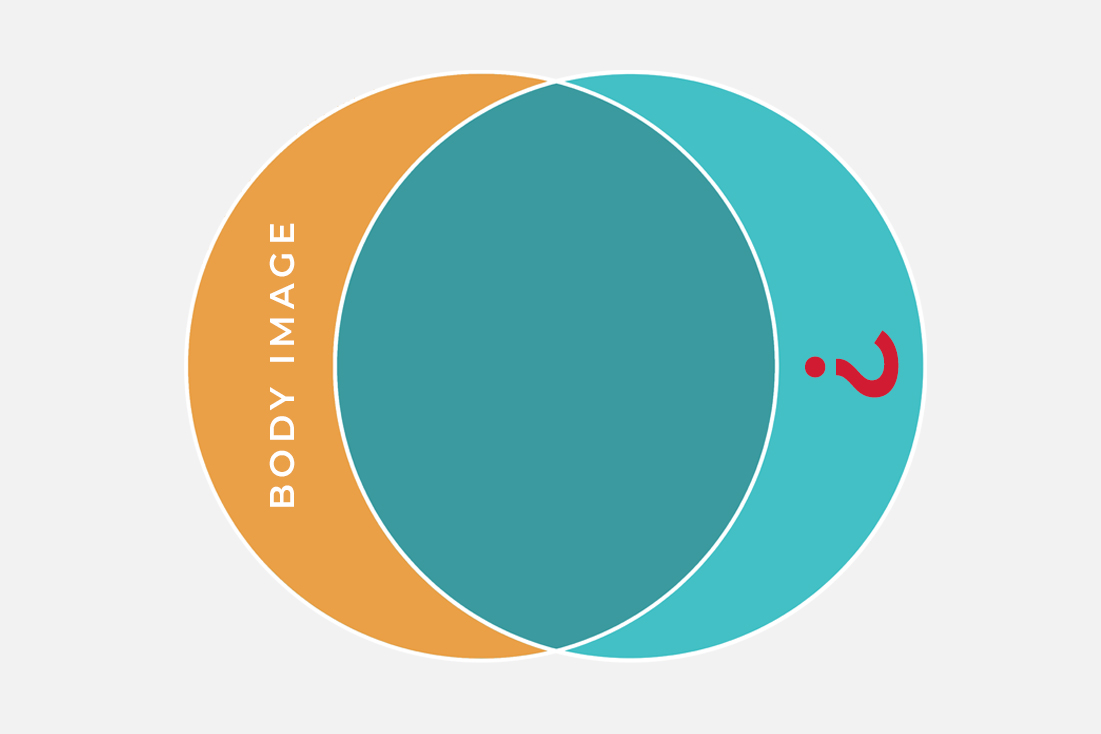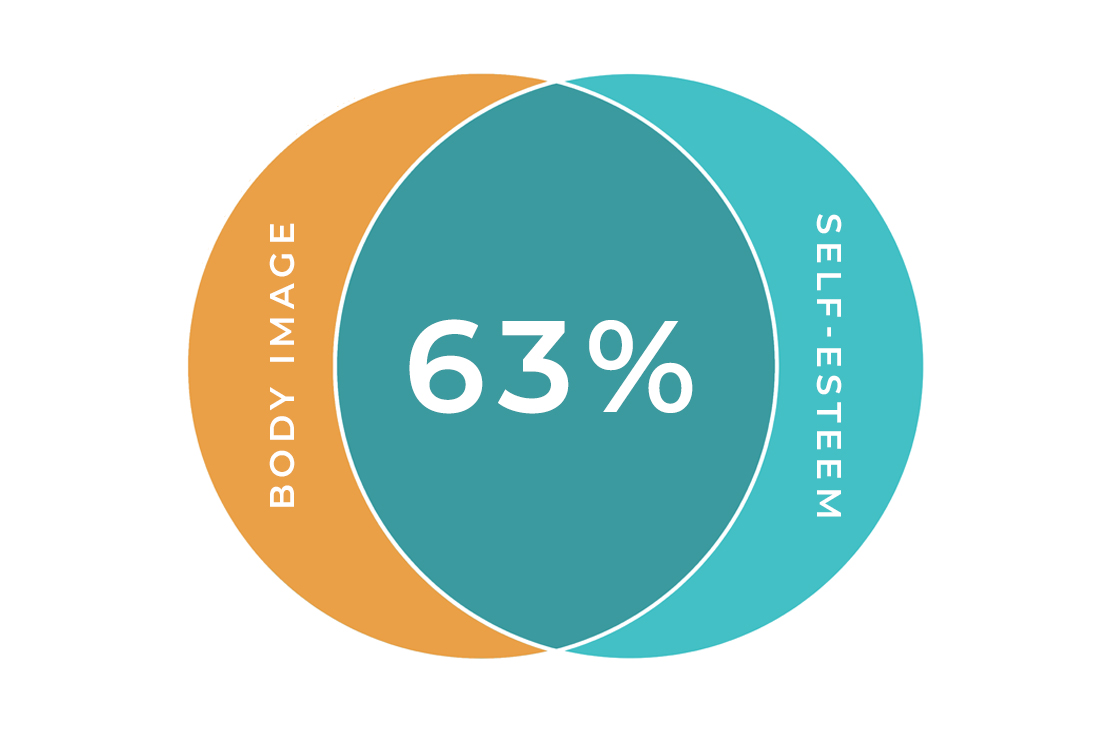
If you’re a member of my community, you’ve probably heard me talk a lot about body image …
I’ve shared about the enormous psychological impact of body image, how body image relates to weight specifically, how you CAN actually change the way you feel about your body, and even 5 simple steps (and 3 psychologist’s secrets) that can help you on your journey towards greater body acceptance.
However, there’s an (often forgotten!) key to unlocking a positive body image that I work on with my clients all the time, and I thought it was time I shared it with you …
The importance of self-esteem.
Let me explain …
While I often hear people use the terms ‘body image’ and ‘self-esteem’ interchangeably, to a psychologist they are actually quite different.
Whereas body image can be described as your relationship with your body, self-esteem is your relationship with yourself. So self-esteem is much broader (and sometimes much deeper!) than body image. It’s not just about how you feel about your body, it’s about how you feel about yourself in general.
So, why does the difference matter, and why is it important to explore your self-esteem if you’ve struggled with accepting your body in the past?
Well, firstly, because in psychology, we want to be fairly confident that we’re working on the right thing.
If a client says ‘I want to feel better about myself!’, they may mean they want to feel better about their body (body image), or better about themselves as a person (self-esteem). Understanding the difference helps us to understand where to put our focus.
But, as importantly, if you’ve struggled with your body image in the past (especially if you’ve struggled despite trying to work on it!), it’s important to explore self-esteem as self-esteem and body image are intimately intertwined.
To explain this, I want to introduce a term as we use it in psychological research, correlation. Correlation is a measure of the association between two things. It is often measured on a scale of 0 (not related at all) to 1 (completely related). For psychological factors, we would generally consider a correlation of .1-.2 a weak association, .3-.4 a moderate association, and .4+ a strong association between two factors.
One study of self-esteem and body image in women living in larger bodies1 found that the correlation between self-esteem and body image was .63, meaning that the two factors are beyond highly related*. The correlation number actually represents a percentage of the crossover between two factors, so what this means statistically is that approximately 63% of your body image can be explained by your self-esteem (and vice-versa).

This makes self-esteem a pretty big factor to ignore if you’re interested in improving your body image, so – even when the main/end goal is an improved body image – it makes complete sense to broaden our focus to consider how your relationship with yourself relates to your relationship with your body.
Of course, the relationship between our self-esteem and our body image is complex. For some people, their body image struggles greatly affect their self-esteem (as we place so much emphasis on the importance of appearance, our body image can get ‘too big for it’s boots’, and end up becoming the dominant force in shaping our self-esteem). For others, their body image challenges are actually a symptom of a low self-esteem (i.e., a more general feeling of ‘not good enough’ that permeates all areas of life, with body image being just one of them). And often, the relationship goes both ways, in a complex interplay between our relationship with ourselves as people and the bodies that we live in.
To add another layer of complexity, self-esteem also affects many other factors that affect body image. For example, people lower in self-esteem tend to experience higher levels of depression and disordered eating2. As depression and disordered eating both also impact body image, self-esteem affects body image indirectly as well as directly. This is another reason why it makes sense to at least investigate the role self-esteem may be playing if you are on the journey to greater body acceptance.
So, how do you know if you could benefit from improving your self-esteem, your body image, or both? Seen as we’re sitting in the mess of change today (as we often do in therapy!), let me give you two answers …
Therapy Glenn answer: Often, I simply ask my clients ‘Do you think it’s more of a body image thing … like about how you feel about your body … or more of a self-esteem kind of a thing … like how you feel about yourself?’. The curious thing is that we almost always have the answers within ourselves, and more often than not, simply by taking a couple of breaths and reflecting, you know what the answer is for you.
Research Geek Glenn answer: I’m a big fan of using actual data in my sessions, so we can see where the client is at (and establish benchmarks from which to measure progress!). If you complete this questionnaire you will get concrete, accurate, and re-testable measures of your self-esteem and body image. They will help you answer the question of whether it will be important for you to work on one, the other, or both**!
Okay (as I often say to my clients when we’re about to wrap up sessions!), I think that’s plenty for us today. I hope your mind hasn’t been bent too much (and – like the therapy notes I send away with clients, this blog may benefit from a re-read or two if you have the time!), but I think it’s important to talk about this often unacknowledged factor when it comes to feeling more comfortable in the skin you’re in. For many of my clients, self-esteem work can ‘unlock’ the benefits of body image work (making it helpful, when it wasn’t before!), so I wanted to take this clinical understanding out of my therapy room and put it into your brain, in case it can help you! 🙂 🙂 🙂
And, I’m not the sort of therapist that will unpack an idea and leave it lying all over the floor, so to help you put these concepts back together in a way that helps you feel better about the body you live in and about yourself as a person, I’m going to share something really special with you in my next email …
So, please hold tight, and I’ll be back soon to share more about how you can cultivate a positive self-esteem and body image in a way that is right for you.

*In fact, with a correlation above .5, statistically speaking, you can say they are actually more related than they are unrelated.
**For self-esteem, use your ‘Self-Esteem (Rosenberg Scale)’ score and for body image use your ‘Body Satisfaction’ score (any scores below the norms for either measure could benefit from some improvement). For body image, you can also look at your ‘Body Uneasiness (Overall)’, ‘Body Image Thoughts – Negative Thoughts’, and ‘Body Image Thoughts – Positive Thoughts’ scores for a more complete picture of your body image (body image is quite complex, and an area of interest for many of our clients and online program members, so we include a few measures of it in the questionnaire). 🙂
References:
1. Grilo, C. M., Wilfley, D. L., Brownell, K. D., & Rodin, J. (1994). Teasing, body-image, and self-esteem in a clinical sample of obese women. Addictive Behaviours, 19 (4), 443-450.
2. Baumeister, R. F., Campbell, J. D., Krueger, J. I., & Vohs, K. D. (2003). Does High Self-Esteem Cause Better Performance, Interpersonal Success, Happiness, or Healthier Lifestyles? Psychological Science in the Public Interest, 4(1), 1–44. https://doi.org/10.1111/1529-1006.01431

